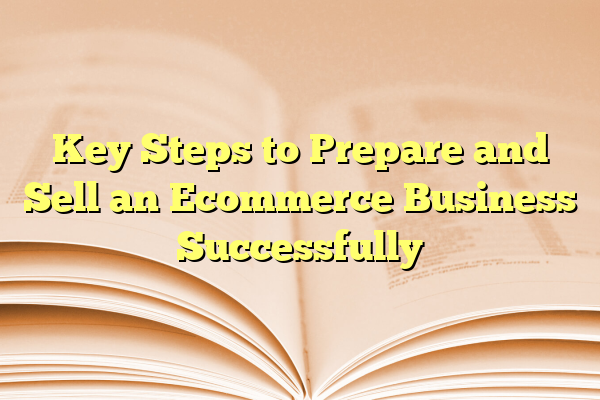
Key Steps to Prepare and Sell an Ecommerce Business Successfully
Thinking about selling your ecommerce business? That’s exciting! 🎉 But before you can pop the champagne, there are some important steps you need to follow. Selling a business is a big deal. Done right, it can make you a lot of money. Done wrong, it could end in frustration.
Let’s break things down in a simple, fun way. No boring lectures here. Just clear, helpful advice!
Contents
- 1 1. Get Your Books in Order
- 2 2. Know What Your Business Is Worth
- 3 3. Make It Look Great
- 4 4. Build Strong SOPs (Standard Operating Procedures)
- 5 5. Reduce Your Dependence on You
- 6 6. Optimize Customer Metrics
- 7 7. Pick the Right Time to Sell
- 8 8. Prepare a Killer Sales Pack
- 9 9. Choose the Right Marketplace or Broker
- 10 10. Be Ready for Due Diligence
- 11 11. Negotiate Smart
- 12 12. Plan for a Smooth Handoff
- 13 Bonus Tip: Know What’s Next
1. Get Your Books in Order
This might sound boring, but it’s super important. Buyers want to see clear financial records. If your numbers are a mess, they’ll run away fast!
- Track your revenue and expenses
- Understand your profit margins
- Use accounting software to keep everything neat
Hire an accountant if needed. It’s worth it, trust us!
2. Know What Your Business Is Worth
How much is your ecommerce biz really worth? You need a proper valuation. This helps you set the right price.
Most ecommerce businesses are valued based on a multiple of their net profit. But other things matter too — like traffic, brand reputation, email list size, and growth rate.
You can use online calculators, but it’s smarter to talk to a broker or professional appraiser.
3. Make It Look Great
Just like you’d clean your house before selling it, you should polish your business up before listing it.
- Improve your website design
- Update product photos and descriptions
- Fix slow-loading pages
- Double-check for broken links
First impressions matter — even in ecommerce!

4. Build Strong SOPs (Standard Operating Procedures)
Can someone else run your business if you step away? If your answer is “maybe,” then it’s time to document everything!
Buyers want a business that runs smoothly. They’ll love seeing your systems and processes clearly written down.
- How do you fulfill orders?
- Where do you advertise?
- Who handles customer service?
- How do you restock items?
The more detailed your SOPs, the better.
5. Reduce Your Dependence on You
This might seem weird, but for a business to sell easily, it shouldn’t rely on you for everything.
If you’re the only one who knows how things run, buyers will see that as risky.
Train a team, outsource tasks, and automate what you can. The goal is to make the business run like a machine — even if you disappear for a week!
6. Optimize Customer Metrics
Buyers love loyal customers and strong returns. So give your metrics some love!
- Lower your churn rate
- Improve customer lifetime value
- Increase your average order value
If numbers look great, buyers will pay more.
7. Pick the Right Time to Sell
Timing is everything!
Make sure your business is in a healthy state. Ideally, you want to sell while things are growing — not declining.
Keep a lookout for seasonality, industry trends, and your own personal goals. Don’t wait until you’re burned out to list your business.

8. Prepare a Killer Sales Pack
This is your business “resume.” It shows buyers why they should invest.
A great sales pack includes:
- Financial statements (past 12-24 months)
- Traffic sources and data
- Customer insights
- Operations overview
- Marketing strategies
- Growth opportunities
Make it polished, professional, and honest. Don’t exaggerate — serious buyers will check everything!
9. Choose the Right Marketplace or Broker
You’ve got options!
- Online Marketplaces: Great for smaller businesses. Sites like Empire Flippers, Flippa, and FE International are popular choices.
- Brokers: Good for larger businesses. They help you find serious buyers, negotiate deals, and charge a fee for their work.
- Private Sale: Sometimes, you can sell directly to someone in your network or industry.
Think about what fits your business best.
10. Be Ready for Due Diligence
This is when the buyer checks under the hood. They’ll want to see receipts, reports, and proof that everything you said is true.
Don’t panic — just be prepared!
- Keep digital folders with organized records
- Have supplier contracts and invoices ready
- Be honest about any challenges
If you’re transparent, it builds trust and speeds things up.
11. Negotiate Smart
Once you’ve got an interested buyer, it’s time to make a deal.
Stay calm and clear about your goals. Know your minimum price but also be open to options — like earn-outs or partial payments over time.
Consider getting a lawyer to review the contract so you protect yourself.
12. Plan for a Smooth Handoff
Selling a business isn’t like selling a car. You don’t just toss over the keys.
You’ll likely need to help with the transition. This could mean:
- Training the buyer
- Answering questions for a set time
- Providing supplier contacts
Be helpful — it’s good karma and helps ensure the business keeps thriving!
Bonus Tip: Know What’s Next
What will you do after the sale? Travel the world? Start a new business? Retire early?
Whatever it is, have a plan. Your next adventure is waiting!
Remember, selling an ecommerce business is a journey. But with preparation, confidence, and a great team, it can also be a huge win 💰.
Get your ducks in a row, show off your amazing work, and go get that deal!
